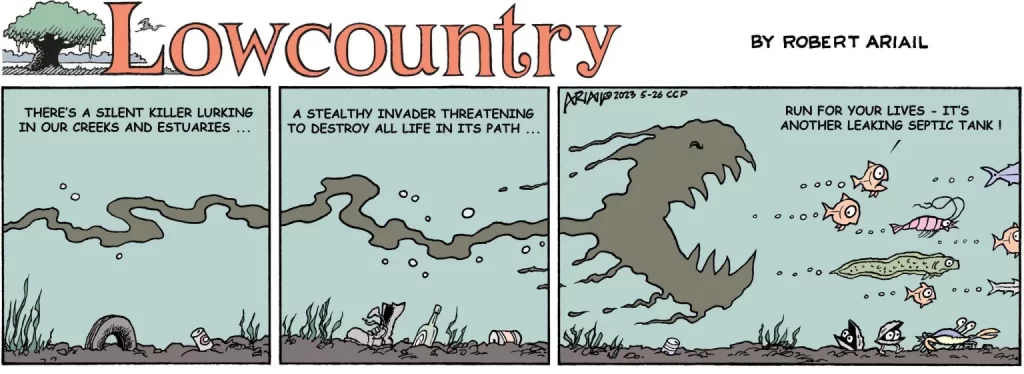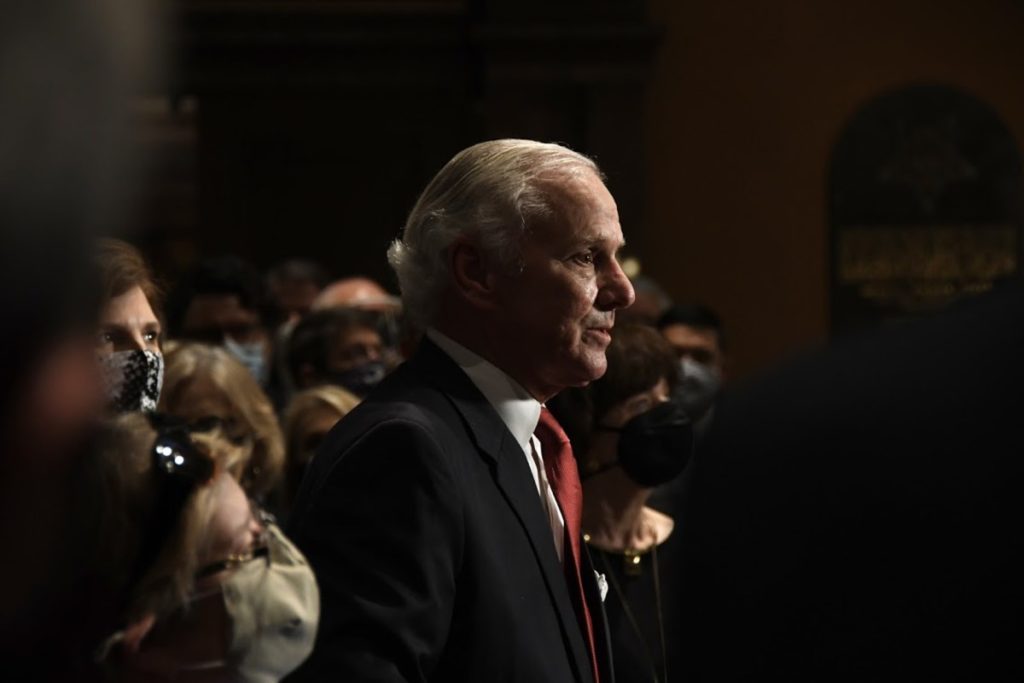STATEHOUSE REPORT | ISSUE 22.21 | May 26, 2023
BIG STORY: Medicaid extension is rolling back in South Carolina
NEWS BRIEFS: S.C. judge blocks state’s new 6-week abortion ban
LOWCOUNTRY, Ariail: South Carolina’s sewer woes
COMMENTARY, Brack: McMaster needs to go to apology school
SPOTLIGHT: Charleston Animal Society
MY TURN, Darby: No Labels ticket is a bad idea
FEEDBACK: Send us your thoughts
MYSTERY PHOTO: Pink flamingo
Medicaid extension is rolling back in South Carolina

By Chelsea Grinstead | Hundreds of thousands of South Carolinians may lose access to Medicaid coverage over the next year, according to state insurance professionals.
“Out of the 1.2 million people who are covered by Medicaid right now [in South Carolina], more than 600,000 people’s coverage is going to be in jeopardy over the next 12 months,” said Shelli Quenga of Summerville, chief innovation officer for statewide social service nonprofit the Palmetto Project that helps residents navigate the insurance marketplace.
The United States government extended the ability to retain Medicaid without renewing in the traditional time period during the Covid-19 pandemic public emergency, which ended May 11. Now, those who benefited from extended coverage, such as pregnant women and young people, may lose their Medicaid coverage permanently or temporarily.
“There’s about 300,000 people that are going to lose coverage because they’re no longer eligible for Medicaid — primarily people over the age of 19 and women who have been pregnant sometime during the pandemic and now exceed the 12-month postpartum coverage,” Quenga told the Charleston City Paper.
An additional 300,000 or more are expected to lose coverage temporarily due to failure to return a renewal form, failure to receive the form or submission of inaccurate information, she said.

South Carolina is one of the 10 states that did not extend Medicaid qualifications under the Affordable Care Act in 2022, said former S.C. Sen. Joel Lourie of Columbia, president and CEO of Lourie Life & Health, which recruits and trains insurance agents, agencies and other groups throughout the Southeast, including the Palmetto Project.
“The states that did not expand Medicaid are going to get impacted worse than those that did,” Lourie told the City Paper.
The largest groups in the Medicaid population of South Carolina are children from lower income families, seniors and women who have lower incomes or are pregnant, Lourie said.
“We’re now going back to pre-pandemic Medicaid requirements,” he said.
Lourie served in the legislature as a Democrat for 18 years, and he said one of his last attempts at passing legislation was to expand Medicaid eligibility.
“We just don’t have the votes to do it,” he said. “The governor could do this with a swipe of a pen, but we don’t have a governor who wants to do that nor the majority of the legislature that wants to do that.”
The state is currently carrying out the first round of redeterminations, Lourie said, and people could lose Medicaid coverage as early as June 1.
Band-Aid health care
“Palmetto Project believes strongly in [health care] access — for every South Carolinian to be [insured and] able to walk in the front door of a hospital,” Quenga said. “Right now, everybody in South Carolina has the ability to access health care through the emergency room. And that’s just a Band-Aid.”

Since 2010, the Palmetto Project has helped about 10,000 people secure Medicaid coverage, Quenga said. She illustrated how South Carolina’s refusal to participate in the 2022 federal Medicaid expansion affected people negatively. Quenga recently was unable to transfer an Ohio woman’s Medicaid status to South Carolina, instead recommending a patchwork of resources such as free clinics, community health centers and prescription assistance programs.
“It’s almost a full time job to manage all of these different pieces in order to put together some kind of [health care] access,” she said.
A lot of U.S. colleges stopped offering students coverage in 2013 when the Affordable Care Act enrollment allowed young people to remain on their parent’s coverage until turning 26 years of age, she said. Some students who are transitioning off Medicaid will not have these options if they can’t join their parents’ plans or because they are not working or not earning enough to meet the income requirements.
“If their parents had coverage, they’d be able to stay on it until they’re 26, but not everybody’s parents are offered coverage from their employer — especially in a poor state like South Carolina [with an] economy [that] runs on tourism. If a parent works at a hotel or a restaurant or as a tour operator, that business is seasonal and they can’t get insurance that way.”
Within the Medicaid system, there are coverage gaps that affect low income individuals and families, Quenga said. Although it’s only a small percentage of people, those who are in the Medicaid coverage gap are individuals who earn too much to qualify for Medicaid but work below the hours required by the Affordable Care Act. There is also no Medicaid coverage for generally healthy, childless adults with no or low income.
“The word ‘gap’ sounds kind of innocuous,” Quenga said. “But really, this is like a chasm. This is a place where people go to die.”
Lourie added, “Everyone knows somebody who’s going to be affected by this,” so he emphasized how important it is for the public to be aware of rollbacks.
“Our health care system operates better and more efficiently, both from a service and a cost standpoint, when more people have coverage,” he said. “This is not only an issue that affects the people who are losing coverage — it affects our state as a whole.”
Lourie said his agency can help individuals and families navigate Medicaid changes as well as the health insurance marketplace, including spreading awareness that renewal paperwork is required to be submitted this year. For more information, visit lourielifeandhealth.com or palmettoproject.org.
Chelsea Grinstead is a reporter with the Charleston City Paper, where this story first appeared. Have a comment? Send to: feedback@charlestoncitypaper.com
S.C. judge blocks state’s new 6-week abortion ban

By Andy Brack (updated 9 a.m., May 27 with court order) | Abortion politics moved at lightning speed this week, first with a six-week ban approved by the legislature Tuesday and signed into law Thursday. But when reproductive freedom advocates almost immediately filed a 167-page lawsuit challenging the ban, it took only a day before S.C. Circuit Judge Clifton Newman today issued a temporary order blocking the ban.
The ban was in effect for only about 24 hours before Newman hit the pause button to allow the state Supreme Court to review the new law — which is remarkably similar to a ban that temporarily went into effect last year before also being paused and later ruled unconstitutional based on the state’s explicit right to privacy.
According to the order: “The South Carolina Supreme Court should resolve the constitutional issues in this case as the court has ruled that a nearly identical law violated the right to privacy. The status quo should be preserved while the South Carolina Supreme Court resolves this case in as expeditious manner as possible.”
So for now, it’s legal and safe for pregnant women in South Carolina to choose whether to have a traditional abortion of up to 22 weeks.
“Today the court has granted our patients a welcome reprieve from this dangerous abortion ban,” said Jenny Black, president and CEO of Planned Parenthood South Atlantic. It, the Greenville Women’s Center and two physician plaintiffs sought a temporary stay to the six-week ban just 40 minutes after it was signed into law Thursday.
“Our doors remain open and we are here to provide compassionate and judgment-free health care to all South Carolinians. While we have a long fight ahead, we will not stop until our patients are again free to make their own decisions about their bodies and futures.”
South Carolina lawmakers spent much of the 2023 legislative session — they still haven’t passed a budget for 2023-24 — arguing over abortion. The S.C. House pushed a near-total abortion ban, which was thwarted by the state Senate. Instead, it approved a so-called “fetal heartbeat” bill to ban most abortions after an embryo’s cardiac activity could be detected in the womb. At that time, most women don’t know they’re pregnant.
But the House insisted on the near-total ban and the issue ground to a halt. Until the final week of the session. That’s when House Republicans caved to the Senate’s version, which eventually made it to the governor this week.
McMaster celebrated the signing, as reflected in this statement, “This is a great day for life in South Carolina, but the fight is not over. We stand ready to defend this legislation against any challenges and are confident we will succeed. The right to life must be preserved, and we will do everything we can to protect it.”
But at 11:07 a.m. Thursday — less than 40 minutes after McMaster signed the ban into law — Planned Parenthood and three plaintiffs filed the 167-page lawsuit in state court seeking a temporary restraining order to block the new law “on the grounds that it violates South Carolinians’ constitutional rights to privacy, equal protection and substantive due process by banning abortion, providing inadequate protections for patients’ health, conditioning sexual assault survivors’ access to abortion on the disclosure of their personal information to law enforcement, violating the Medicaid Act, and improperly targeting Planned Parenthood through an unconstitutional bill of attainder.”
At the time, Black said South Carolina lawmakers “have once again trampled on our right to make private health care decisions, ignoring warnings from health care providers and precedent set by the state’s highest court just a few months ago. The decision of if, when and how to have a child is deeply personal, and politicians making that decision for anyone else is government overreach of the highest order.”
In other recent headlines:
![]() S.C. budget impasse could detail employee, teacher raises. A continued standoff threatens more than $1 billion in proposed additional spending, including planned raises for state employees and teachers.
S.C. budget impasse could detail employee, teacher raises. A continued standoff threatens more than $1 billion in proposed additional spending, including planned raises for state employees and teachers.
More than 20,000 died from COVID-19 in S.C. More than 20,000 residents died during the pandemic, according to state data. In the last week, less than 1,200 new cases of COVID-19 for the week that ended May 20, with 10 new deaths.
Scott kicks off presidential campaign in North Charleston. After months of speculation, U.S. Sen. Tim Scott, R-S.C., on Monday told a packed crowd at his hometown alma mater, Charleston Southern University, that he is running for president of the United States. He becomes the second South Carolinian running for the GOP nomination for president, joining former Gov. Nikki Haley, who announced earlier this year.
S.C. GOP re-elects chairman in close vote. State Republican reelected Drew McKissick on May 20 as party chairman for a fourth term after he was challenged by two hard-right candidates.
Feds indict Murdaugh on 20+ financial charges. Convicted murderer and former attorney Alex Murdaugh has been charged for the first time by federal prosecutors accusing him of more than 20 financial crimes, including 14 counts of money laundering, five counts of wire fraud, two counts of conspiring to commit fraud and one count of bank fraud.
Sewer woes

Cartoonist Robert Arial, always creative and entertaining, offers this take on persisting environmental threats. Love the cartoon? Hate it? What do you think: feedback@statehousereport.com.
McMaster needs to go to apology school

By Andy Brack | S.C. Gov. Henry McMaster doesn’t need to go into comedy anytime soon. He’s just not that funny.
What he needs to do is to go to apology school.
 The governor, who often sounds like Foghorn Leghorn these days, had this to say to fellow Republicans last week at a state convention: “I look forward to the day that Democrats are so rare, we have to hunt them with dogs.”
The governor, who often sounds like Foghorn Leghorn these days, had this to say to fellow Republicans last week at a state convention: “I look forward to the day that Democrats are so rare, we have to hunt them with dogs.”
Umm. Not funny, governor. Really not funny. Even if you claim you’ve been saying it for years, it has never been funny.
Democrats responded with outrage about McMaster’s dog-whistle of a comment.
“Yesterday, Governor Henry McMaster threatened me, my family and thousands of other Anderson County residents who are Democrats when he said he looks forward to the day he can ‘hunt us with dogs,’” said Chris Salley, chairman of the Anderson County Democratic Party, in a statement.
Charleston County Democratic Party Chairman Sam Skardon went further: “We cannot continue to normalize threats of political violence from the leadership of the Republican Party. If the governor does not retract and apologize, S.C. State Law Enforcement Division should investigate this threat.”
One man who lived through apartheid in South Africa recalled on Facebook how many people in that country were silent about its system of segregation: “Their silence spoke volumes. If you do not stand up against racism, if you remain silent, you are part of the problem.”
But maybe McMaster, a former attorney general who should know about keeping the peace more than inciting it, thought what he said was hilarious. The governor of any state should know better, particularly in an America today more polarized by race, fear and hate than in years.
What our governor said was mean, mean-spirited and filled with racial undertones of South Carolina’s ugly past in which white elites subjugated enslaved Africans and actually did hunt them when they escaped. Or hanged them, such as when Charlestonians executed Denmark Vesey and 34 others for what was purported to be a planned slave uprising. Or they just plain lynched them after the Civil War to reignite fear to fuel horrible decades of home-grown Jim Crow apartheid.
It’s not a history of which to be proud.
But predictably, the spin-doctors and fixers played McMaster’s comment off as a light-hearted joke. That’s what the embarrassment playbook says to do – just foist anything out on a lazy public that the person saying the trash didn’t really mean it.
Here’s how the Washington Post reported on the remark: “In a statement Monday, a spokesman for McMaster said the governor had been saying the line at GOP conventions for years, adding that ‘everyday South Carolinians understand that it’s a joke.’”
The joke might have worked in the 1950s, which is where McMaster and his buddies seem to want us to return. But rather than continuing to brush off the remark, the governor needs to realize he represents all South Carolinians, not just the ones who may look like him.
To drive this point home: Just imagine what would happen if a blue state governor started talking about crucifying pro-life activists. And then said it was just a joke. I bet McMaster, Fox News and most Republicans would squeal like stuck pigs. The vitriol surely would be intergalactic.
So governor, let’s lay off the bad jokes, the over-the-top rhetoric and the increasingly hostile politics that continue to pull people apart. There’s not going to be any Kumbaya moment in South Carolina anytime soon, but you can stop throwing gas on the fire.
Andy Brack, recognized in 2022 as the best columnist in South Carolina, is editor and publisher of Statehouse Report and the Charleston City Paper. Have a comment? Send to: feedback@charlestoncitypaper.com.
Charleston Animal Society
 We’re pleased today to shine our spotlight on the Charleston Animal Society, leader in the effort to make Charleston County a safe place for animals. Now the society is working to expand its Charleston success statewide to energize the state to reshape its 300-plus shelters and animal organizations into a no-kill network that stretches from Walhalla to Little River to Daufuskie Island.
We’re pleased today to shine our spotlight on the Charleston Animal Society, leader in the effort to make Charleston County a safe place for animals. Now the society is working to expand its Charleston success statewide to energize the state to reshape its 300-plus shelters and animal organizations into a no-kill network that stretches from Walhalla to Little River to Daufuskie Island.
Safe and healthy communities, neighborhoods and families don’t just happen – they’re built. “No Kill – No Harm – No More” shines a spotlight on animal abuse and family violence, which are often perceived and treated as separate issues. However, animal abuse is often the tip of the iceberg to larger issues in the home, such as child abuse, elder abuse or domestic violence.
- South Carolina’s most honored charity four years in a row
- National model for success
- Southeast’s only AAHA-accredited combined clinic and shelter
- Focused on solving problems rather than reacting to them year after year
- Publishes Carolina Tails, the largest pet magazine in S.C.
- No Kill. No Harm. No More. is a “movement” comprised of two major initiatives: No Kill Charleston and No Kill South Carolina.
- Learn more about the Charleston Animal Society and its work to create a humane network for the animals that bring joy to our lives.
No Labels ticket is a bad idea

By the Rev. Joseph A. Darby | I recently received an email from former Congressman Joe Cunningham inviting me to get involved in the “No Labels” movement to create a 2024 Presidential ticket that would include Democratic and Republican running mates. I also read his recent column in The Post and Courier making his argument for the idea. Both of those things prompted me to share a few thoughts.

I voted for Mr. Cunningham and I respect his opinion. I hope that he’ll respect mine, because I believe his “No Labels” presidential ticket proposal is an incredibly bad idea.
Mr. Cunningham’s column argument is primarily based on a recent ABC News-Washington Post poll that shows President Joe Biden losing to Donald Trump. Experience has taught me that there’s a difference between a single provocative poll result and an identifiable trend.
Polls can be unreliable — as were the 2016 polls that showed Hillary Clinton defeating Donald Trump — and polls often exclude the opinions of broad cultural swaths of America.
I fielded plenty of calls in 2019 from national media asking me whether Joe Biden should withdraw from the Democratic presidential primary race after struggling in the Iowa and New Hampshire primaries. My response was “wait until South Carolina speaks.” The rest is history.
The 2019 South Carolina primary result also points to something that I encourage Mr. Cunningham to consider. He said in his column that “Democrats are failing to offer an alternative that appeals to the majority of voters who crave change and are fed up with the extremes on both sides” and makes the case for appealing to moderate voters. His noble assertion ignores today’s political reality.
By Mr. Cunningham’s logic, there’s a significant group of Republicans and conservative independents who would find affinity with what would basically be a third-party alternative. If they do exist, they need to openly question and condemn Donald Trump’s demagoguery. That’s not happening.
He also asserted that by that single poll’s results, Mr. Trump can win without anyone’s help. That didn’t happen in 2020 or in 2022 when most of his candidates crashed and burned and the predicted “red wave” turned out to be a trickle.
Mr. Trump and the GOP’s election victories have come as a result of something that Republicans do well — motivating and turning out their base of voters, even if that motivation is often laced with fear and bigotry.
Too many Democratic candidates focus on winning over voters who seldom vote their way while assuming their base will automatically turn out. They’re right in assuming that most in their base will vote Democratic, but they often fail to realize that without motivating their base, many of them will simply opt to stay home.

That’s especially true when Democrats ignore and insult their base. Mr. Cunningham did that in his last campaign, when he tailored his campaign to those he met at craft brewery events but seldom showed up at Black community events. He also did so in his recent column, when he referred to Vice-President Kamala Harris — who is highly admired and respected by the Democratic base – as “woefully unpopular.”
Mr. Cunningham noted that in his farewell speech to the House of Representatives, he spoke of the need for us to have bipartisan cooperation and to “sit down and listen to each other.” He also noted that he took that same message home to South Carolina as the 2022 Democratic candidate for governor.
For the record, Republican Henry McMaster was elected governor in 2022 by the largest percentage in decades and many Democratic incumbents and new candidates lost their races as they rode Mr. Cunningham’s political “coattails.”
A friend of mine voted for Green Party presidential candidate Ralph Nader in a very close 2000 Presidential election as what he called a “vote of conscience.” Mr. Nader didn’t win, but he drew votes away from Al Gore and gave us George W. Bush, who put John Roberts and Samuel Alito on a U.S. Supreme Court that has gutted the Voting Rights Act and Roe v. Wade and has diminished our civil liberties.
We don’t need to make the same mistake in 2024 with a No Labels “vote of conscience.” We need a major party president who will preserve the republic and give life to the American pledge of “liberty and justice for all.”
The Rev. Joseph A Darby is pastor of Nichols Chapel African Methodist Episcopal Church in Charleston.
Send us your thoughts
We encourage you to send in your thoughts about policy and politics impacting South Carolina. We’ve gotten some letters in the last few weeks – some positive, others nasty. We print non-defamatory comments, but unless you provide your contact information – name and hometown, plus a phone number used only by us for verification – we can’t publish your thoughts.
Have a comment? Send your letters or comments to: feedback@statehousereport.com. Make sure to provide your contact details (name, hometown and phone number for verification. Letters are limited to 150 words.
Pink flamingo

Here’s a picture that might have a few years on it. What is it and where is it? Send us your guess – as well as your name and hometown – to feedback@statehousereport.com.
 Last week’s mystery, “Magnificent building,” came from veteran sleuth and photographer Barry Wingard of Florence. It shows the Lawton-Chase House, which formerly housed the Florence Museum in Timrod Park on Spruce Street. The building, now owned by the City of Florence, is used as an event center.
Last week’s mystery, “Magnificent building,” came from veteran sleuth and photographer Barry Wingard of Florence. It shows the Lawton-Chase House, which formerly housed the Florence Museum in Timrod Park on Spruce Street. The building, now owned by the City of Florence, is used as an event center.
David Taylor of Darlington sent us the text on a historical sign in front of the building:
“This Art Moderne house, completed in 1939 for Joseph Maner Lawton, has housed the Florence Museum since 1953. It was designed by Sanborn Chase, then an engineering student influenced by Moderne architecture in France and later a prominent local businessman. The house features curved streamlined forms, a semicircular glass block entrance bay, and black glass bands just below the roofline. When completed it was described as ‘the talk of Florence.’
“The Florence Museum, chartered in 1936, was founded by the Florence Museum Committee, a group of civic-minded women who had organized as the Blue Bird Tea Room Committee during World War I. It was housed in the basement of the Florence Public Library from 1939 to 1952, when the museum board acquired this house. Its collection of fine art, archaeological and historical artifacts, and natural science exhibits was opened to the public here in 1953.
This week’s correct spotters included: Will Bradley of Las Vegas, Nevada; Elizabeth Jones and Jay Altman, both of Columbia; George Graf of Palmyra, Va.; Scott Brown of San Jose, Calif.; Allan Peel of San Antonio, Texas; Jacie Godfrey and Pam McDaniel, both of Florence; and Pat Keadle of Wagener.
>> Send us a mystery picture. If you have a photo that you believe will stump readers, send it along (but make sure to tell us what it is because it may stump us too!) Send to: feedback@statehousereport.com and mark it as a photo submission. Thanks.
- ORDER NOW: Copies are in Lowcountry-area bookstores now, but if you can’t swing by, you can order a copy online today.
- Now available as an e-book!
ABOUT STATEHOUSE REPORT
Statehouse Report, founded in 2001 as a weekly legislative forecast that informs readers about what is going to happen in South Carolina politics and policy, is provided to you at no charge every Friday.
- Editor and publisher: Andy Brack, 843.670.3996
Donate today
We’re proud to offer Statehouse Report for free. For more than a dozen years, we’ve been the go-to place for insightful independent policy and political news and views in the Palmetto State. And we love it as much as you do.
But now, we can use your help. If you’ve been thinking of contributing to Statehouse Report over the years, now would be a great time to contribute as we deal with the crisis. In advance, thank you.
Buy the book
Now you can get a copy of editor and publisher Andy Brack’s We Can Do Better, South Carolina! ($14.99) as a paperback or as a Kindle book ($7.99). . The book of essays offers incisive commentaries by editor and publisher Andy Brack on the American South, the common good, vexing problems for the Palmetto State and interesting South Carolina leaders.
More
- Mailing address: Send inquiries by mail to: P.O. Box 21942, Charleston, SC 29413
- Subscriptions are free: Click to subscribe.
- We hope you’ll keep receiving the great news and information from Statehouse Report, but if you need to unsubscribe, go to the bottom of the weekly email issue and follow the instructions.
- Read our sister publication: Charleston City Paper (every Friday in print; Every day online)
- © 2023, Statehouse Report, a publication of City Paper Publishing, LLC. All rights reserved.
















 We Can Do Better, South Carolina!
We Can Do Better, South Carolina!